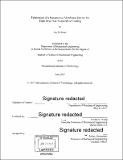Fabrication of a nanoporous membrane device for high heat flux evaporative cooling
Author(s)
Sircar, Jay D
DownloadFull printable version (11.48Mb)
Other Contributors
Massachusetts Institute of Technology. Department of Mechanical Engineering.
Advisor
Evelyn N. Wang.
Terms of use
Metadata
Show full item recordAbstract
We investigated the experimental performance of a nanoporous membrane for ultra-high heat flux dissipation from high performance integrated circuits. The biporous evaporation device utilizes thermally-connected, mechanically-supported, high capillarity membranes that maximize thin film evaporation and high permeability liquid supply channels that allow for lower viscous pressure losses. The 600 nm thick membrane was fabricated on a silicon on insulator (SOI) wafer, fusion-bonded to a separate wafer with larger liquid channels. Spreading effects and overall device performance arising from non-uniform heating and evaporation of methanol was captured experimentally. Heat fluxes up to 412 W/cm2, over an area of O.4x 5 mm, and with a temperature rise of 24.1 K from the heated substrate to ambient vapor, were obtained. These results are in good agreement with a high-fidelity, coupled fluid convection and solid conduction compact model, which was necessitated by computational feasibility, which incorporates non-equilibrium and sub-continuum effects at the liquid-vapor interface. This work provides a proof-of-concept demonstration of our biporous evaporation device. Simulations from the validated model, at optimized operating conditions and with improved working fluids, predict heat dissipation in excess of 1 kW/cm2 with a device temperature rise below 30 K, for this scalable cooling approach.
Description
Thesis: S.M., Massachusetts Institute of Technology, Department of Mechanical Engineering, 2017. Cataloged from PDF version of thesis. Includes bibliographical references (pages 60-63).
Date issued
2017Department
Massachusetts Institute of Technology. Department of Mechanical EngineeringPublisher
Massachusetts Institute of Technology
Keywords
Mechanical Engineering.